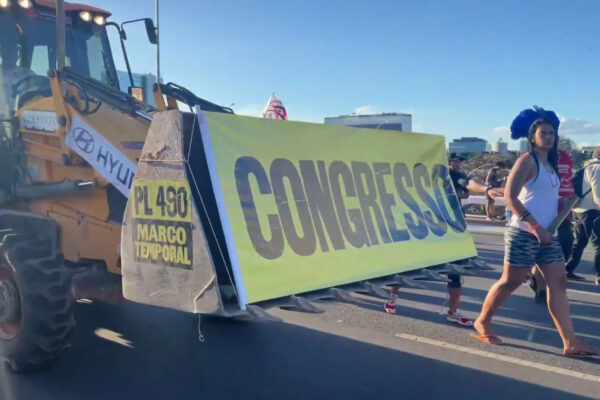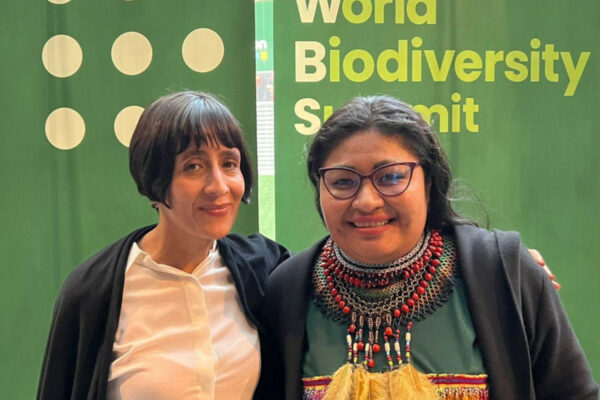Señor
Ing. Jorge Quiroga Ramírez
Constitutional President of Bolivia
La Paz
REF: THE CUIABÁ PIPELINE AND THE DESTRUCTION OF THE CHIQUITANO FOREST.
Mr. President:
In response to publications by the U.S.’s Washington Post and the national press, that told of the destruction of the Chiquitano forest provoked by the construction of the gas pipeline to Cuiaba, which is owned by the multinationals ENRON and SHELL, and because of the inefficiency of the Chiquitano Forest Conservation Plan (PCBC) promoted questionable and illegal Foundation for the Conservation of the Chiquitano Forest (FCBC) created by these same companies, the affected Indigenous peoples declare the following:
1. The government is responsible for and complicit with the destruction of the Chiquitano forest and the existing social and environmental conflicts in the zone, because it issued the environmental license for the construction of the pipeline to the benefit of ENRON and SHELL without transparency and appropriate discussion with Bolivian society; and omitting our warnings, it permitted the negotiation of the forest for a sum of 20 millions dollars toward four unscrupulous NGO’s (Friends of Nature Foundation, Friends of the Noel Kempf Mercado Museum of Natural History Foundation, the Missouri Botanical Garden-MBG- and the Wildlife Conservation Society-WCS). Given that there exist resolutions from the Santa Cruz Departmental Counsel and requirements from the Public Defender to reorient the PCBC in a manner that respects the law and the rights of Indigenous Peoples, the ministers of Sustainable Development: Reyes Villa, Mc Lean and Cavero, made fun of the LAW. In exchange for what?
2. We denounce that the multinational companies failed to fulfill the Indigenous Development Plan (PDI) because their objectives never were totally fulfilled. They have deceived us with a compensation of two years while the foreign owners will have benefits for forty years. They failed to fulfill the Land Titling Program and the Agricultural Support Program, limiting the possible sustainable development of the communities affected by the pipeline.
3. The FCBC, managed by the national sub-boss of the MNR [political party] violates national sovereignty by assuming the right of conservation of the Chiquitano forest without the consent and agreement of the communities that inhabit the forest, nor the very state itself. It does not render [financial] accounts to the state, nor to civil society, acting without transparency, provoking division and confrontation among organizations and local institutions. It violates the dignity of our communities and indigenous organizations, violating rights established in International Labor Organization Convention 169. It establishes agreements with private and public institutions without having proper legal incorporation status. It generates conflicts through interests that emerge, dominating indigenous territories and communities without their agreement and consent. It attempts to legitimate its activities offering money in exchange for signatures on agreements. It negotiates the forest’s natural resources that are not its property. In its governing board are two NGOs (WCS and MBG) publically accused of biopiracy through illicit traffic of genetic resources in Bolivia and other countries.
4. Considering the serious existing social and environmental impacts in the Chiquitano Dry Forest, an ecosystem unique in the world, patrimony of humanity, now destroyed by the construction of the pipeline, whose Right of Way is being used for the illegal loggin, the irrational hunting of wild fauna, the introduction of illegal cattle, and the re-opening of an abandoned gold mine, our organizations have formally appealed to the Ministry of Sustainable Development for the initiation of an Environmental Audit. We are asking you to instruct the appropriate agencies to guarantee the transparency of this process, with the goal of quantifying damages, sanctioning those responsible, indemnification for disasters and reorientation of the Conservation Plan such that it is Participatory, Sustainable, and Worthy for Bolivians.
5. Before the Chiquitano Forest begins to be totally destroyed, we solicit your Government to enforce the LAW and take all measures possible to intervene and suspend activities of the supposed Foundation and thus stop the embezzlement of the economic resources destined to conserve our natural resources. These measures are urgent to protect what remains of the forest and to preserve this important Bolivian and world patrimony, just as our ancestors knew how to preserve it.
Your excellency, we know that you erred in backing the flagrant violation of the State’s Political Constitution when your party approved the Heart Law that permits foreign businesses to be proprieters of investments within national borders; but we appeal to your dignity as a Bolivian in order that within the framework of the fight against poverty, inequality and social exclusion that your government proclaim and rectify this injustice that ENRON and SHELL now bring upon us with the complicity of the ever-present political thread that gave away the gas [for nothing] and now intends to steal our natural resources.
With the force of the forest and the men and women that inhabit it, we hopefully await your worthy attention.
In representation of the affected indigenous peoples:
SIGNATURES: Carlos Cuasace, Chiquitano Indigenous President, Daniel
Picaneray, Presidente CANOB, CPESC
********************************
May 6, 2002
Dr. Peter Watson
President
Overseas Private Investment Corporation
1100 New York Avenue, N.W.
Washington, D.C. 20527
Dear Dr. Watson:
Thank you for meeting with us recently to continue our dialogue with respect to projects and policies related to the Overseas Private Investment Corporation (OPIC). We were disappointed that this discussion was short, but hope that there is room to proceed further on outstanding issues in the coming weeks. While some issues discussed such as the World Commission on Dams and OPIC’s tropical forest prohibition resulted in documents that will take time for us to review and comment upon, we feel that it is of the utmost importance that OPIC work with us on several concerns related to the agency’s alarmingly close ties with the Enron Corporation.
Several Enron-related concerns were raised in our meeting and need further discussion and resolution:
· OPIC has cancelled its financial agreements with Enron regarding the Cuiaba pipeline and power plant project. Significant promises were made by OPIC with respect to environmental and social protections that would occur on the condition that OPIC’s Board approved the Cuiaba project. For instance a $20 million conservation fund that OPIC lauded as a cornerstone of financial approval has been a complete failure primarily because Enron locked out indigenous communities from control in the decisionmaking process. In addition OPIC promised ongoing monitoring and prevention of secondary and cumulative project impacts that are now becoming real and dangerous threats to the Chiquitano Forest and local communities. Those promises were not met by Enron nor were they met by OPIC.
· We believe that some of these promises can be resolved with proper broader acknowledgement from the U.S. Government for its role enabling the negative impacts in Bolivia. A mechanism for repairing the damage done and resolving outstanding promises is now sought. Accordingly, we reiterate the request for a meeting between you, representatives of interested Bolivian non-governmental organizations with a view to resolving these outstanding concerns.
· With respect to both the Cuiaba project and the broader OPIC-Enron relationship, we maintain there are a number of lessons that should be drawn with a view to significant policy reforms at OPIC. These reforms we believe cover not just environmental and social issues, but also include and are not limited to internal operating policies, proper financial and risk due diligence, over-emphasis on certain corporate “clients”, and an over-emphasis on particular industry sectors within your power/energy portfolio. Accordingly we would like to request that OPIC release an official “lessons learned” document on the Cuiaba project and also one document more broadly focusing on agency dealings with the entire Enron-related portfolio.
· Due to our ongoing review of several Enron projects and local allegations of corruption, we request that OPIC provide us with an explanation of how the Foreign Corrupt Practices Act (FCPA) is applied in the due diligence, contractual and subsequent monitoring process at OPIC for a) the finance department projects, b) the insurance department projects and c) the investment funds and their sub-projects. If there are differences in how the FCPA is viewed and applied within any of these three arms of OPIC, we would request that such information be disclosed as well.
We thank you for this ongoing dialogue and appreciate the opportunity to work towards appropriate and fair resolution of the concerns in the coming weeks.
Sincerely,
Derrick Hindery
Amazon Watch
Emilie Thenard
Center for International Environmental Law
Aaron Goldzimer
Environmental Defense
Jon Sohn
Friends of the Earth
Daphne Wysham
Institute for Policy Studies
Doug Norlen
Pacific Environment













